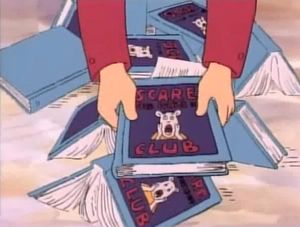The forum pages are fully operational! See this link for the latest forum topics, where users can collaborate or discuss certain topics in one place!
Difference between revisions of "Scare-Your-Pants-Off Club"
Tag: rte-source |
Tags: apiedit visualeditor |
||
| Line 13: | Line 13: | ||
*''House of the Jackal Lantern'' ("[[The Fright Stuff]]") | *''House of the Jackal Lantern'' ("[[The Fright Stuff]]") | ||
*''Bloodsucking Beavers of Bavaria'' ("[[Just Desserts]]") | *''Bloodsucking Beavers of Bavaria'' ("[[Just Desserts]]") | ||
*''Curse of the Jumping Peanut'' | *''Curse of the Jumping Peanut ("''[[Buster Hits the Books]]") | ||
*''The Haunted Hamburger Stand'' ("[[The Scare-Your-Pants-Off Club]]"; possible title) | *''The Haunted Hamburger Stand'' ("[[The Scare-Your-Pants-Off Club]]"; possible title) | ||
*''Which Witch Is Which?'' ("[[Arthur and the Scare-Your-Pants-Off Club]]") | *''Which Witch Is Which?'' ("[[Arthur and the Scare-Your-Pants-Off Club]]") | ||
Revision as of 15:04, 1 August 2016

The Scare-Your-Pants-Off Club is a series of children's horror novels written by E. A. DePoe.
Popularity
The series first appeared in Arthur's Lost Library Book. At the Elwood City Public Library, a new copy of the Scare-Your-Pants-Off Club book comes out and Arthur is the first to check it out, but he loses it. In a later Season 1 episode titled The Scare-Your-Pants-Off Club all of the kids are waiting in line at the library for the release of the new book, but they all get disappointed because P.A.W.S., or Parents Against Weird Stories got the books banned from libraries. At the end of the episode, it is revealed who writes the books.
Books in the Series
- The Mysterious Hand ("Arthur's Lost Library Book")
- Curse of the Mummy's Breath ("The Scare-Your-Pants-Off Club"/"Arthur and the Scare-Your-Pants-Off Club")
- Bones in the Attic ("The Scare-Your-Pants-Off Club")
- Zombie Substitute Teacher ("The Scare-Your-Pants-Off Club"/"Arthur and the Scare-Your-Pants-Off Club")
- The Lunchbox of Notre Dame ("Night Fright")
- House of the Jackal Lantern ("The Fright Stuff")
- Bloodsucking Beavers of Bavaria ("Just Desserts")
- Curse of the Jumping Peanut ("Buster Hits the Books")
- The Haunted Hamburger Stand ("The Scare-Your-Pants-Off Club"; possible title)
- Which Witch Is Which? ("Arthur and the Scare-Your-Pants-Off Club")
- Night of the Cornstalker ("Arthur and the Scare-Your-Pants-Off Club")
- Skeletons in the Closet ("Arthur and the Scare-Your-Pants-Off Club")
Trivia
- The Lunchbox from Notre Dame is a parody of the classic book The Hunchback of Nortre Dame by Victor Hugo.
- The Scare-Your-Pants-Off series and its author E.A. Depoe, are obvious parodies of the best-selling childrens horror series Goosebumps and their author, R.L. Stine. It is also a reference towards the concern that the books drew from parent groups.